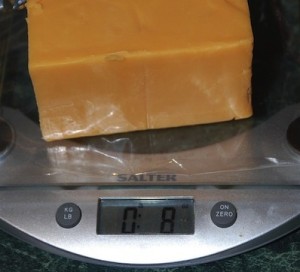
Lee, Matt and Ted Lee, While the Bird’s Still Stuffed, But Before the Guests Are, F1, New York Times, Nov. 27, 2002. Did you know your library has old newspapers online – with recipes in them? Handy, huh?
This is actually one recipe with two applications. The brothers Lee wrote up the no-cookie-press-needed cheese straw recipe and I recognized the pastry as quite similar to what my mother used to wrap olives in for hors d’oeuvres. Yes, it was the seventies, what’s it to you? First the Lee’s faux cheese straws:


Since this is just cheesy pastry, it makes sense to do it in the food processor like any other pâte brisée – it’s fast and foolproof. It also means all those fiddly processor bits to clean, so I never do this unless I’m at least doubling the recipe. (If you do more than double, you have to do it in batches – even our new 11 cup processor won’t do more than a double batch well.)
Parts list:
- 4 oz. extra-sharp Cheddar cheese, grated
- 4 Tbsp. butter, softened and cut into 4 pieces
- 3/4 c. flour
- 1/2 tsp. salt
- 1 tsp. crushed red pepper (this is the right amount, but reduce if you don’t like even a little heat)
- 1 Tbsp. half-and-half
Grate the cheese in the processor, switch to the steel blade, then pulse cheese, butter, flour, salt and red pepper until you’ve got clumpy sand or coarse crumbs. Add the half-and-half (or milk or cream), and process until dough forms a ball – it should only take a few seconds, depending on temperature and moisture in your cheese.
I think a rest/chill for 15 minutes or half an hour is helpful at this point, but it’s up to you. The Lees’ say one recipe makes a rectangle 8 by 10 inches and 1/8 inch thick. To make the straws, cut dough into thin strips, 1/4 to 1/3 inch wide. Gently transfer each ”straw” to an ungreased cookie sheet, leaving a 1/4-inch space between them, and bake 17 minutes, or until the ends are barely browned. Let cool.
If you’re doubling the Lee’s recipe to use 8 oz., you can probably buy a block in just that size at the store. Otherwise, it’s handy to have a scale. We buy the plain sharp cheddar in the giant two pound blocks and cut it up.

You can use a pizza cutter or a fancy pastry cutter, though I usually just use a paring knife – dip it in some flour if it sticks. If you have a roulpat, do be extra careful not to cut it when cutting your pastry – it would be best to move your rolled dough to another surface to cut (but I live dangerously).

Once baked off, the straws cool quickly and remain crisp for a few days, but they’re best warm. I’d suggest keeping some dough in the fridge and baking them when folks drop by so they’re fresh and warm. Unless you don’t want to encourage that sort of behavior.
Now, about that part that I added… the olives. People will have strong feelings about these, one way or the other. Either they’ll love them and pester you for them on a regular basis, or… not. I live with an anti-olive person. That’s fine… more for me.


Cheesy Olives is a nice additional use of the cheese pastry. Just roll it out and cut into squares or triangles to wrap around the olives of your choice. The only trick it to make sure that your olives are really well drained. I drain in a colander then press them gently in a paper towel.
Once you have the olives wrapped in the pastry and put on a baking sheet, they can be frozen. Once frozen on the sheet, put them in resealable freezer bags and store for a spur of the moment party.
To bake, just put on a small pice of foil (no dishes!) and pop in the oven or toaster oven for about 15 minutes (the “everything bakes at 350F and burns at 450F” rule holds here). If you’re doing a real batch – not just for yourself – a little butter on the foil or the cookie sheet will surely keep them from sticking, but it’s usually not a problem for me. The worst that happens is you get a little tear in the crust. Smaller olives might bake faster – once the pastry is set and starts to brown a tiny bit, they’re done.
Oh, and these will be about 10,000,000F internal temperature when they come out of the oven. Give them five minutes at least. You’ve been warned.

Big hit at our New Year’s Eve party — just the olives, not sticks. A few thoughts as I made them:
1) The cheese amount is perfect, though I was tempted to bump it up while mixing. It’s perfect.
2) Wrapping the olives thoroughly (but not overmuch) took some practice, and I’m still not sure what the best shape is.
3) The double recipe covered a large jar of spanish olives and a small deli container of large green olives, with only a handful left over.
If you want a “stronger, cheesier” taste, try sharper cheese. I never use the “medium cheddar” for just this reason. You could try subbing a few ounces for some blue cheese as well – a roqufort would likely standup just fine. Note that as you increase sharpness of the cheese, taste it – often they are quite salty, so adjust the salt in the recipe accordingly.
I use a triangle or a rectangle to wrap, pinch up the sides while pressing out any air, then give them a firm roll between my hands to even out the thickness. Just watch the heat: no one likes melted pastry. It’s easier once you get the knack – and if you use very well drained olives.